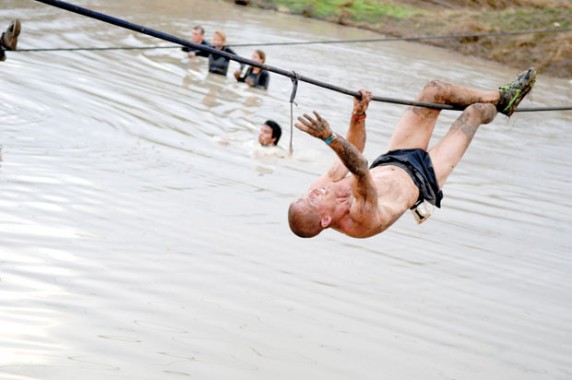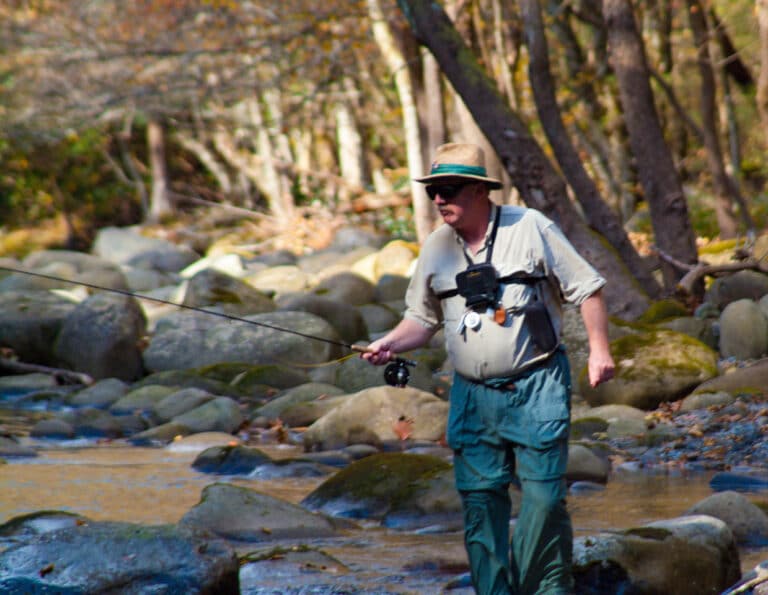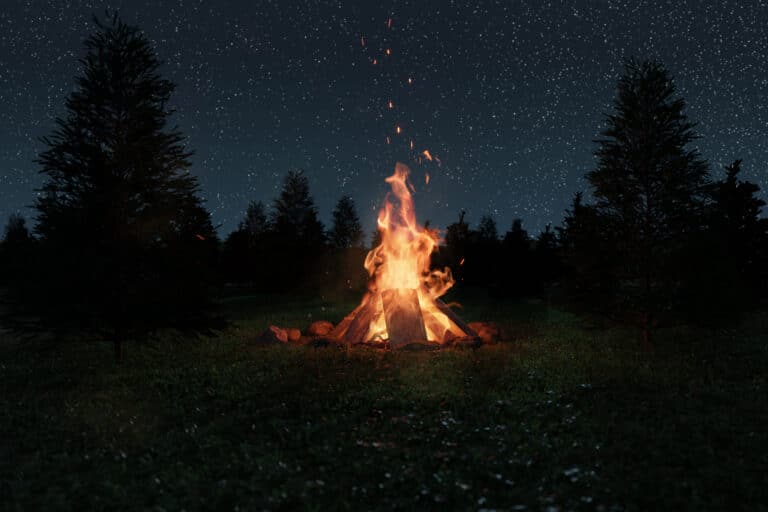Hobie Call crosses a river during a 2011 Spartan Race. Photo by Nuvision Action
Spartan Race champ Hobie Call weighs the future of obstacle racing
By Coleman Wood
Hobie Call is probably not someone you would consider a “normal” runner. For years, Call ran marathons while working a full-time job and raising a family. By 2008, nearing his mid-30s, he began thinking up extreme running feats, setting the unofficial world record for the fastest lunge mile (24:56) and setting several unofficial running records while wearing a 40-pound weighted vest (he ran a 4:40 mile while wearing one).
In 2011, the founder of the Spartan Race series, Joe DeSena, offered $100,000 to anyone who could win all 14 of his Spartan Races (including the Death Race) in the U.S. that year. Call won six races in a row and was on his way to a sweep until he had to drop out of the Death Race due to near-hypothermia. He has competed in 33 obstacle races since 2011. Here are his thoughts on one of America’s fastest growing sports.
BRO: How did you first get involved in obstacle racing?
I had been plagued by injuries for much of 2009-2010, and five months before my 34th birthday I decided that I had given it my all. I decided to race a few marathons in 2011, hopefully make a few thousand dollars, and then retire my dream.
But then a miracle happened. Some crazy guy named Joe DeSena was offering $100,000 to anyone who could win all of his Spartan obstacle races in the US in 2011. As luck would have it, I just happened to be doing high-intensity upper body workouts along with my running at the time so I wouldn’t have to run outside in the dark every day. That, coupled with my strength-based running program, had me believing that I might just excel at this kind of race.
What was your first obstacle race like?
For the first time in I couldn’t even tell you how many years, I felt like a kid again. Never had a race proved to be as uniquely challenging, exciting, and fun as this one. Immediately I knew I had found my sport. Road racing, trail running and triathlons just didn’t compare. For the first time after the race people weren’t standing around talking about their times or how many miles they run a week. They actually talked about the race itself.
What is your training regimen leading up to an obstacle race? How do you train for a race that changes each time you run it?
I was running three times a week and doing upper body three times a week. My leg days were more strength-based running as opposed to speed- or endurance-based, for example, running with a weight vest and doing a lot of weighted lunges. My upper body workouts were very cardio-intensive — a good mixture of dumbbell exercises and body-weight exercises, with the focus on making sure I worked every muscle through a full range of motion to eliminate any weaknesses.
To know how to train, I just need to know the amount of speed I need to have for the fastest races, the amount of endurance for the longer races, minimum strength required for the toughest obstacles and then train to those specifications. That is why I lost the Vermont Beast both years; it takes almost twice as long to complete as the second longest race in the series, and I just don’t train for that kind of endurance.
After missing out on the $100,000 Spartan Race prize in 2011, you went on to win all but one of the remaining Spartan Races for the rest of the year. What motivated you to keep trying to win after the prize money was off the table?
Money is nice — after all, we all need it to pay our bills — but if it was really about the money, I would have given up many years ago. You can’t stop living your dream just because things don’t always go your way.
What is the appeal of running an obstacle race, many of which are designed to break the spirits of even the strongest competitors?
It’s absolutely awesome. To overcome such challenges makes these events life-changing moments for so many people. Just to be in the festival area after the race is very rewarding. It’s not very often that you get to be around so many people that have just overcome some of the greatest challenges life has thrown at them.
Why do you think participating in obstacle races is growing at a much faster rate than traditional races?
Five reasons:
(1) They are more fun to train for;
(2) They are more fun to race;
(3) They are more uniquely challenging and, thus, a more rewarding experience to overcome;
(4) They are more fun to watch;
(5) The opportunity to help others and to receive help from others during the event is also very rewarding and something to look forward to.
Do you think the goal of most people competing in these races is to win? If not, what is?
No, only a select few are focused on winning. For most, it’s the unknown and uniqueness of the challenges, the opportunity to push yourself to a new level, and the camaraderie that you build with fellow athletes while on the course.
With several serious injuries and fatalities reported at obstacle races over the past two years, do you think these events can go too far?
They could, but I think they’ve done a pretty good job so far of not doing that. You as an individual still need to use good judgment while on the course and know when to skip an obstacle if you don’t feel safe. In all reality, just as many people are seriously injured and die in marathons. Safety is more about the individual using good judgment than about the course.







